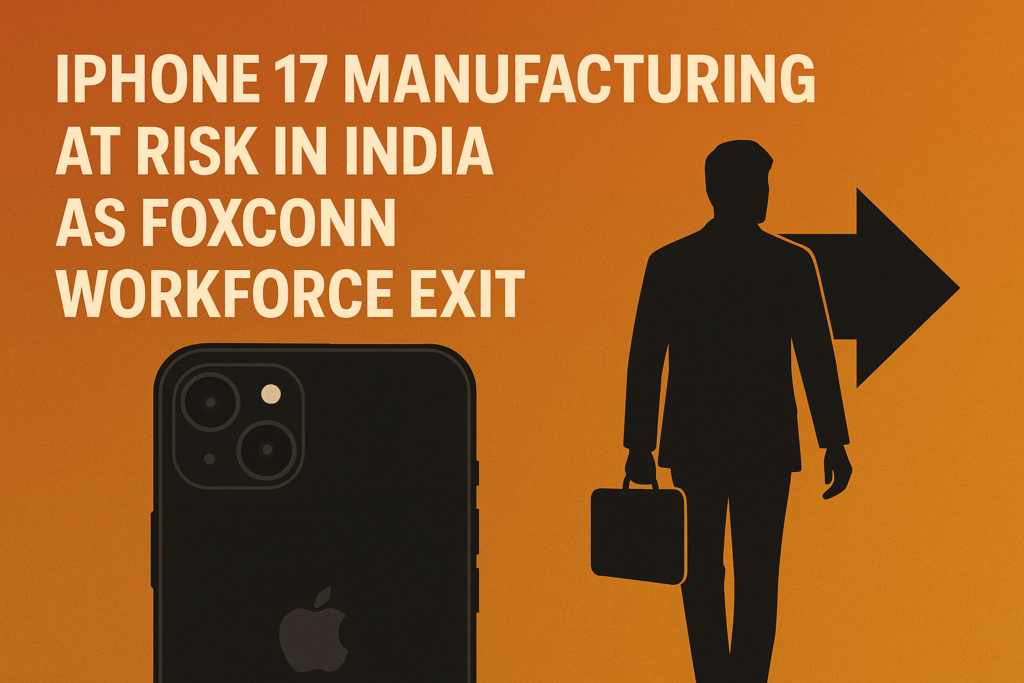

iPhone 17 Manufacturing at Risk in India as Foxconn Workforce Exit
A Sudden Disruption in Apple’s India Expansion
In a move that has raised eyebrows across the global tech manufacturing sector, Foxconn — Apple’s primary iPhone assembler — has reportedly recalled over 300 Chinese engineers and technicians from its Indian facilities. This unexpected development, reported by Bloomberg, comes at a critical juncture as Apple gears up to manufacture its highly anticipated iPhone 17 in India. The withdrawal not only signals internal operational challenges but also reflects deeper geopolitical tensions between the US and China that continue to influence global supply chains.
Foxconn’s India Strategy: A Growing Footprint
Foxconn, headquartered in Taiwan, has been at the center of Apple’s strategy to diversify its supply chain away from China. With increasing pressure from geopolitical uncertainties and tariff threats, India emerged as a promising alternative. The Indian government’s support, combined with robust incentives under the Production Linked Incentive (PLI) scheme, led to a rapid scale-up of Foxconn’s operations in the country.
Between March and May 2025, Foxconn exported iPhones worth $3.2 billion from India. Of these, an impressive 97% were shipped to the United States, according to Reuters. In May alone, nearly $1 billion worth of iPhones were exported, making it the second-highest monthly figure ever — just behind the March 2025 record of $1.3 billion.
Recall of Chinese Staff: A Setback for iPhone 17 Manufacturing
The recall of over 300 Chinese engineers poses a significant hurdle for Apple’s manufacturing timeline. These professionals brought years of experience in precision assembly, quality control, and high-volume production — expertise that is currently limited within the Indian labor pool. While the reasons for the recall remain unclear, the timing could not be worse, as Apple is in the advanced stages of preparing for the iPhone 17’s production cycle.
Industry analysts suggest that this move could slow down Apple’s production targets in India, particularly if replacements are not trained or onboarded promptly. The dearth of skilled personnel in India for high-end electronics assembly may stall Apple’s plan to shift the majority of its US-bound iPhone manufacturing to India by 2026.
Also Read; Mahindra Auto Sales Surge 14% YoY in June 2025, Driven by
Geopolitical Underpinnings: US-China Trade War’s Ripple Effect
The recall must be viewed within the broader context of global geopolitics. The ongoing US-China trade tensions continue to shape the strategic decisions of multinational companies. In a controversial statement in May 2025, former US President Donald Trump criticized Apple’s overseas production strategy and threatened to impose a 25% tariff on iPhones not manufactured within the United States.
Such remarks fuel uncertainty in global trade policy and put additional pressure on tech giants to reassess their supply chain models. For Apple, which is heavily reliant on Asia-based assembly lines, diversifying to India was both a strategic and economic imperative. However, the reliance on Chinese expertise has now become a vulnerability in this transition.
India’s Semiconductor Push: Strengthening the Tech Ecosystem
Despite current challenges, India remains committed to becoming a major electronics and semiconductor hub. In April 2025, the Indian government approved Foxconn’s joint venture with the HCL Group to build a semiconductor facility in northern India. The Rs 3,700 crore (approximately $432 million) investment signals a significant push to localize high-tech manufacturing and reduce dependency on imports.
If successful, this venture will not only boost India’s semiconductor capabilities but also support Apple’s long-term supply chain needs, from assembly to chip production.
Conclusion: iPhone 17 Manufacturing What Lies Ahead for Apple and India?
The recall of Chinese engineers by Foxconn is a momentary setback, but it underscores the fragile balance of talent, geopolitics, and industrial policy that defines global electronics manufacturing today. Apple’s vision of making India a cornerstone of its global supply chain is still viable, but achieving that goal will require robust investment in local talent development, training, and infrastructure.
India’s role in the iPhone production ecosystem has grown remarkably — now accounting for 20% of global iPhone output. However, the current disruption could delay timelines and force Apple to recalibrate its operational strategies.
Also Read; शून्य निवेश; बिजनेस आइडिया और निष्पादन रणनीति रणनीति
In the longer run, success will hinge on how quickly India can build a self-sufficient, skilled workforce capable of matching the precision and scale of China’s decades-old electronics industry. As Apple and Foxconn navigate these uncertainties, the outcome will likely reshape the global tech manufacturing map for years to come.



